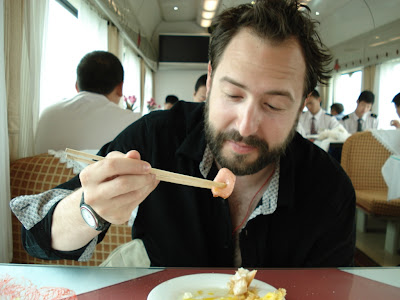 I said goodbye to Xiao on the Subway because he left for art school from the main Beijing train station and I left from Beijing West. Before I could leave however, I had to retrieve the rest of my baggage from LeoHostel and meet up with Anne Done who would become my comrade in arms as we traversed the Chinese countryside. To make a long story short, the taxi driver almost left us on the side of the road and when we finally did make it to the train station we had to drag all our baggage across the entire station (two football fields?) up and down stairs. Now, a normal person would have packed a reasonable amount of clothing and made sure that it would not take a herculean effort just to walk down a flight of stairs with one's luggage. However, I seemed to lack the normal gene and I packed everything I could think of, leaving me with a 74 pound bag along with my huge traveler's back pack full of camping gear (thanks to Matthew and Betcie who got me the bag for my Europe trip in 1999), my large computer bag with books in it, my new Mao "Serve the People" shoulder bag, and another random bag full of tea and Chinese herbs for altitude sickness. In any case, I think the people in my cabin were afraid when they first saw the amount of stuff I had to store above our berths. But as it turned out, there was an empty berth on the top for the entire trip so my over-sized bag that didn't fit in the storage compartment slept there.
I said goodbye to Xiao on the Subway because he left for art school from the main Beijing train station and I left from Beijing West. Before I could leave however, I had to retrieve the rest of my baggage from LeoHostel and meet up with Anne Done who would become my comrade in arms as we traversed the Chinese countryside. To make a long story short, the taxi driver almost left us on the side of the road and when we finally did make it to the train station we had to drag all our baggage across the entire station (two football fields?) up and down stairs. Now, a normal person would have packed a reasonable amount of clothing and made sure that it would not take a herculean effort just to walk down a flight of stairs with one's luggage. However, I seemed to lack the normal gene and I packed everything I could think of, leaving me with a 74 pound bag along with my huge traveler's back pack full of camping gear (thanks to Matthew and Betcie who got me the bag for my Europe trip in 1999), my large computer bag with books in it, my new Mao "Serve the People" shoulder bag, and another random bag full of tea and Chinese herbs for altitude sickness. In any case, I think the people in my cabin were afraid when they first saw the amount of stuff I had to store above our berths. But as it turned out, there was an empty berth on the top for the entire trip so my over-sized bag that didn't fit in the storage compartment slept there.Chinese trains have four types of seating: Hard sleeper, soft sleeper, hard seat, and soft seat. A couple of English girls that provided me with bread and jam for breakfast on the first morning were on soft seats the whole way to Lhasa. It looked like living in a nomad's living room on an uncomfortable armchair for two days. I actually saw a guy with a huge piece of raw yak meat just chilling on the floor, I don't know if he even had a proper seat. Luckily Xiao had purchased my ticket in advance and found me a middle hard sleeper, one of the better possible seats. The soft sleepers still have six beds like the hard sleeper but they are nicer and have doors on their cabins. There were a bunch of chill older Germans and some crazy weird Southerners staying in the soft sleepers. But the fun was generally had in the hard sleeper areas and the one dining car.
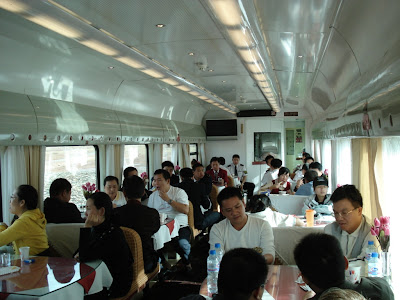 This is the site of the attempt to convince me to pay 14 Yuan for 2 Yuan rice. There is a police officer sitting directly to my left and the head waiter stood right in front of him and tried to cheat us for lunch. The best part was that Peter, the Swedish surgeon staying with the Tibetan rock band we met, had payed differed prices for the same food every time he went into the dining car. Luckily Anne was with us and she was used to this kind of behavior.
This is the site of the attempt to convince me to pay 14 Yuan for 2 Yuan rice. There is a police officer sitting directly to my left and the head waiter stood right in front of him and tried to cheat us for lunch. The best part was that Peter, the Swedish surgeon staying with the Tibetan rock band we met, had payed differed prices for the same food every time he went into the dining car. Luckily Anne was with us and she was used to this kind of behavior.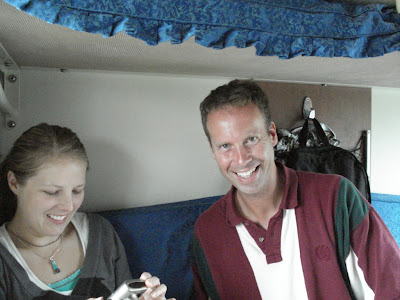 Here's Anne and Peter. Peter was traveling to Everest Base Camp on holiday. He was in the same cabin as these guys:
Here's Anne and Peter. Peter was traveling to Everest Base Camp on holiday. He was in the same cabin as these guys: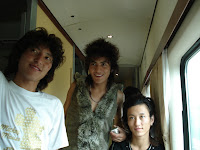
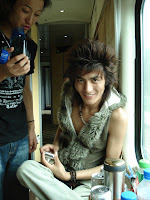 I tried to speak to them and they got very excited and offered me beer and chips, but they soon realized I couldn't say very much. So they found a Chinese interpreter to write the name of their band, their new CD, and the place they would be playing for seven nights in Lhasa.
I tried to speak to them and they got very excited and offered me beer and chips, but they soon realized I couldn't say very much. So they found a Chinese interpreter to write the name of their band, their new CD, and the place they would be playing for seven nights in Lhasa.So, in China, Pabst makes water:
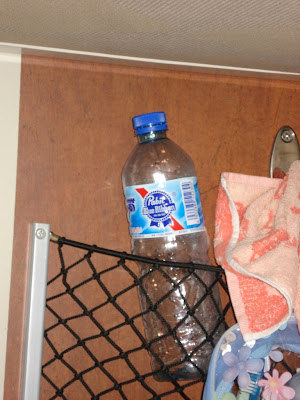
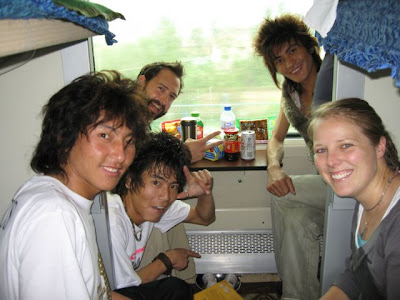 Here's Anne tickled pink that she is hanging out with hot Tibetan men. We also met a man and his wife who spoke only Amdo kay but were very friendly. This other kid seemed to be related to them but I wasn't sure exactly how.
Here's Anne tickled pink that she is hanging out with hot Tibetan men. We also met a man and his wife who spoke only Amdo kay but were very friendly. This other kid seemed to be related to them but I wasn't sure exactly how.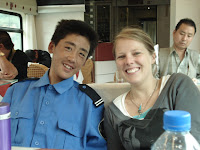
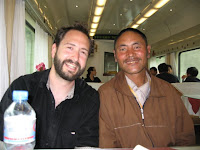 The man to my left saw that Anne and I were practicing the Tibetan alphabet so he came and sat next to me and helped us with pronunciation. I asked him simple questions but many words were different because he spoke Amdo kay (a mdo skad). We asked him what the words for "bottle" and "tomato" were, and he asked me to teach him to count to ten in English. As we were counting in Tibetan and English, a police officer walked by, became excited, and began counting in Mandarin very loudly. He seemed to be implying that we should be studying Chinese words and not Tibetan, but I just smiled at him and showed him that I could count to three in both Tibetan and Chinese and since Anne knew all the numbers very well he seemed to calm down and wander off. The Chinese seem to have several maxims they assume are agreed upon by all: 1) Chinese is the best language and everyone should learn it 2) Foreigners of any kind are good for business but not much else 3) Everything that could be done by one person should be done by at least four people moving at half speed.
The man to my left saw that Anne and I were practicing the Tibetan alphabet so he came and sat next to me and helped us with pronunciation. I asked him simple questions but many words were different because he spoke Amdo kay (a mdo skad). We asked him what the words for "bottle" and "tomato" were, and he asked me to teach him to count to ten in English. As we were counting in Tibetan and English, a police officer walked by, became excited, and began counting in Mandarin very loudly. He seemed to be implying that we should be studying Chinese words and not Tibetan, but I just smiled at him and showed him that I could count to three in both Tibetan and Chinese and since Anne knew all the numbers very well he seemed to calm down and wander off. The Chinese seem to have several maxims they assume are agreed upon by all: 1) Chinese is the best language and everyone should learn it 2) Foreigners of any kind are good for business but not much else 3) Everything that could be done by one person should be done by at least four people moving at half speed.The train culture was very strange indeed but I found that most people were very nice and interested in whatever it was this strange bearded man was doing in China. One random guy even invited me to his home in some industrial town in southern China. I think he was a chemical engineer of some sort. We tried to communicate through his broken English and my Lonely Planet Mandarin phrasebook. All the younger Tibetans we met spoke both Chinese and Tibetan and knew a few words of English. But when I tried to write out Tibetan phrases, they seemed to understand what was written in the Mandarin phrasebook better than the Tibetan one. I am not sure if this was because of the poor quality of the Tibetan phrasebook or because they read Chinese better than Tibetan.
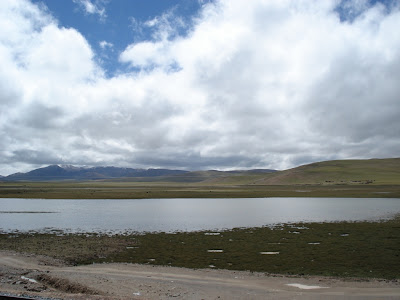
Here we are at :
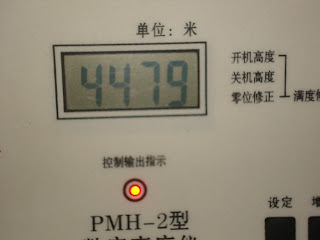
That's meters we're talking about.
An inch and a quarter shy of 14,695 feet.
Every car has a little glass-encased elevation reader with information about oxygen flow, regulated by what was usually a sleeping uniform likewise encased in glass. Between walking from my cabin at the front of the train and the dining car at the back I saw scenery like this:
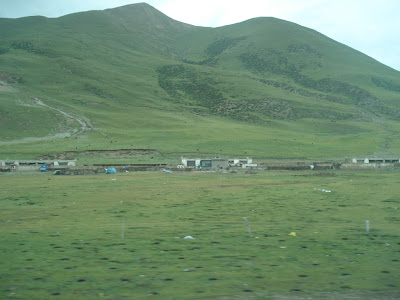 A small village in the hills.
A small village in the hills.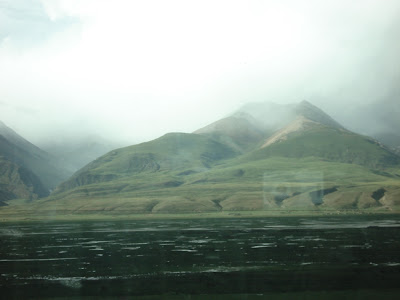
Mountains, mountains, and more mountains...
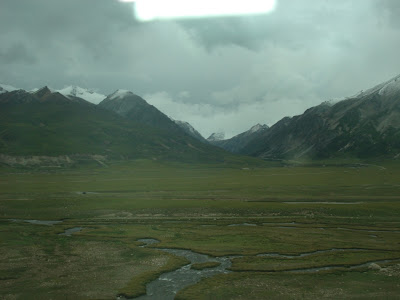
There were often quick storms and even a little bit of snow on our journey.
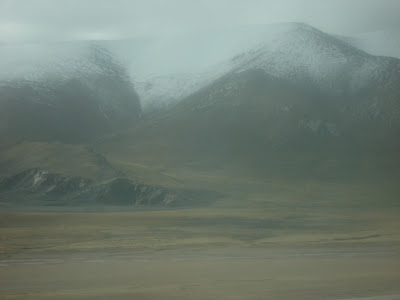 Here is the brand new Lhasa train station at our arrival:
Here is the brand new Lhasa train station at our arrival: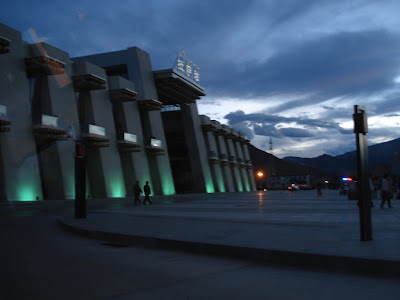 After 48 hours on the train I was glad to arrive in Lhasa, but mostly I just wanted to sleep in a real bed. A young man in my cabin gave me this Kha-ta and said "Welcome to Lhasa" in his best English.
After 48 hours on the train I was glad to arrive in Lhasa, but mostly I just wanted to sleep in a real bed. A young man in my cabin gave me this Kha-ta and said "Welcome to Lhasa" in his best English.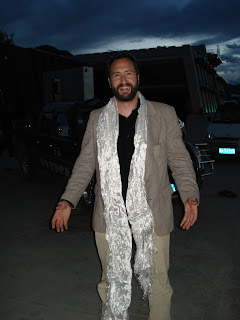 Anne and I got in a taxi and had to wait for another passenger, who happened to be a monk. We made it to the University very quickly because the driver passed most vehicles on the left in the middle of the city with the oncoming traffic of tour buses, bicycles, and taxis. Apparently staying in one's lane, or even on one's side of the street is not the norm here in Lhasa.
Anne and I got in a taxi and had to wait for another passenger, who happened to be a monk. We made it to the University very quickly because the driver passed most vehicles on the left in the middle of the city with the oncoming traffic of tour buses, bicycles, and taxis. Apparently staying in one's lane, or even on one's side of the street is not the norm here in Lhasa.Upon our late evening arrival we found a darkened hallway and our dorm rooms with the help of Ngodron, the sometimes secretary, sometimes nightclub trip leader.
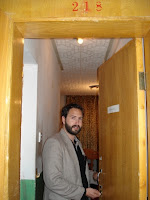
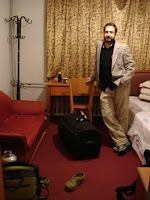 Here's my new pad: # 218
Here's my new pad: # 218And here's the sights from the front step of the Foreign Student's Building:
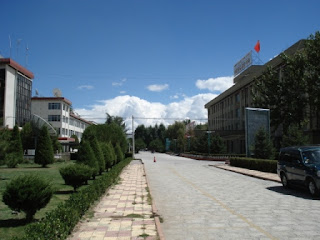 A road we rarely walk on and a new green apparently cleaned up because the "big boss" from Beijing is coming to town in October to inspect the University.
A road we rarely walk on and a new green apparently cleaned up because the "big boss" from Beijing is coming to town in October to inspect the University.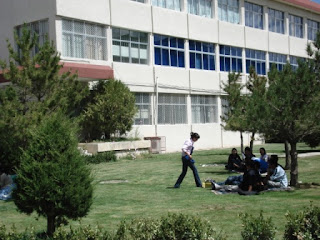 The foreign student's building, home away from home:
The foreign student's building, home away from home: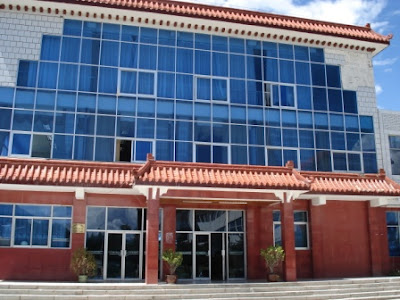
The first foreign students arrived to study in the Tibetan Language Department in 1993 and in 1999 the department acquired the building I now live in as the "Foreign Student International Exchange and Cooperation Center." Later a separate department was created as the Foreign Affairs and Foreign Student's Department, now separate from the Tibetan Language Department, but still under the wing of the School for Humanities at Tibet University. The University itself has three campuses and about 5,000 students. It began in 1951 as a PLA school, became a teacher training school in the '70s, and then finally acquired its title Tibet University about 22 years ago. Terms go from late August/mid September to Dec 23rd and early (?) March to July 20th. Next year the foreign students will be moved to a new building in the new university campus outside of town, which will have nicer accommodations that are more expensive but probably actually function year round.
There are six main staff in the Foreign Student's Department, WH and HM work in the office with ST who gets our permits and organizes travel for us foreigners; HP is the head teacher and the other two staff are not around yet so I haven't met them. There is also our wonderful maintainence man, CP, who was just let the gas get turned off again for several days. Most phones don't work, although several can receive calls. The laundry machine is in the bathroom of the restaurant on the bottom floor of our building and most of us stay on the second floor. The third floor being reserved for movie watching, awkward meet and greet sessions, and the clothes drying area, a.k.a., the roof. The view from the roof is beautiful at night, as both the stars, and Lhasa's red Eiffel tower are visible most nights. I'm not kidding about that, there is a huge military radio tower visible from everywhere in the city that is covered in red lights so that at night it looks like the Eiffel tower.

1 comment:
Tibetan Rockers! Did you get a cd? how is the altitude treating you? kep rockin and rollin!
Post a Comment